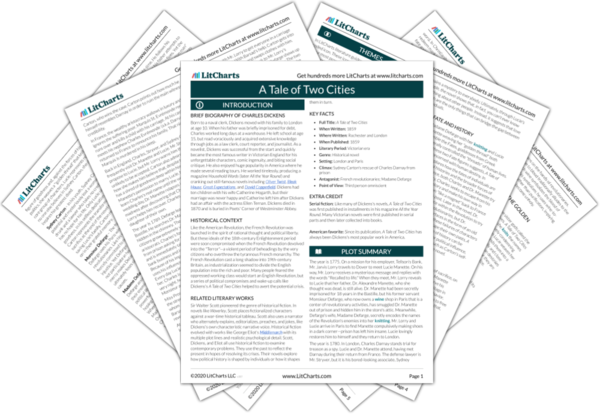Charles Darnay (a.k.a. Charles Evrémonde)
Renouncing the terrible sins of his family, the Evrémondes, Charles abandons his position in the French aristocracy to make his own way in England. Charles believes in the revolutionary ideal of liberty, but is not…
read analysis of Charles Darnay (a.k.a. Charles Evrémonde)
Dr. Alexandre Manette
An accomplished French physician who gets imprisoned in the Bastille, and loses his mind. In his madness, Manette embodies the terrible psychological trauma of persecution from tyranny. Manette is eventually "resurrected"—saved from his madness—by the…
read analysis of Dr. Alexandre Manette
Lucie Manette
The daughter of Dr. Manette, and Charles's wife. With her qualities of innocence, devotion, and abiding love, Lucie has the power to resurrect, or recall her father back to life, after his long…
read analysis of Lucie Manette
Sydney Carton
In his youth, Sydney Carton wasted his great potential and mysteriously lost a woman he loved. Now he's a drunk and a lawyer who takes no credit for his work. Carton has no hope for…
read analysis of Sydney Carton
Monsieur Defarge
The former servant of Dr. Manette, Defarge uses his Paris wine shop as a place to organize French revolutionaries. Like his wife, Madame Defarge, Defarge is fiercely committed to overthrowing tyranny and avenging…
read analysis of Monsieur Defarge
Get the entire A Tale of Two Cities LitChart as a printable PDF.

Madame Defarge
The wife of Monsieur Defarge, Madame Defarge assists the revolutionaries by stitching the names of their enemies into her knitting. Madame Defarge wants political liberty for the French people, but she is even more…
read analysis of Madame Defarge
Jerry Cruncher
By day, an odd-job man for Mr. Lorry. By night, a "resurrection man"—robbing graves to sell body parts to sketchy doctors. He complains about his wife's praying because it makes him feel guilty about…
read analysis of Jerry Cruncher
Mrs. Cruncher
The wife of Jerry Cruncher (and mother of Young Jerry), Mrs. Cruncher's regular praying constantly upsets Cruncher, who feels that it interferes with his work. Though in fact her praying interferes only in the…
read analysis of Mrs. Cruncher
Young Jerry
The son of Jerry Cruncher and Mrs. Cruncher. Young Jerry is just a boy, but he becomes curious about what work his father goes off to do at night-time. He follows his father one…
read analysis of Young Jerry
Minor Characters
Marquis St. Evrémonde
Charles's uncle and a cruel French aristocrat committed to preserving the power of the French nobility. He and his twin brother exemplify the tyrannical and uncaring aristocracy. When the Marquis is murdered, his corpse is a symbol of the people's murderous rage.
Mr. Jarvis Lorry
An older gentleman who works for Tellson's bank, Lorry is a model of loyalty and discretion. Lorry hides his emotions under the cover of "business," but he works hard to save the Manettes and to encourage Charles to become Lucie's husband.
Mr. Stryver
A lawyer who defends Charles Darnay. Stryver, as his name implies, only cares about climbing the professional ladder.
John Barsad (a.k.a Solomon Pross)
Barsad was born Solomon Pross, brother to Miss Pross, but then became a spy, first for the English, then later for the French government. He is an amoral opportunist. In England, he accuses Charles Darnay of treason.
Jacques Three
"Jacques" is the code name for every male revolutionary; they identify themselves by number. Jacques Three is a cruel, bloodthirsty man who represents the corruption of the Revolution's ideals. He controls the jury at the prison tribunals.
The Vengeance
A peasant woman from Paris and Madame Defarge's ultraviolent sidekick. Like Madame Defarge and Jacques Three, The Vengeance enjoys killing for its own sake, not for any reasonable political purpose.
The mender of roads (the wood-sawyer)
A French working man who represents how average people become seduced by the worst, most violent qualities of the Revolution.
Gabelle
A servant of Charles Evrémonde who carries out Charles's secret charities. Gabelle is jailed simply by association with the aristocracy, showing how justice flies out the window during the Revolution.
Roger Cly
A spy and colleague of John Barsad who faked his death to escape prosecution.
Miss Pross
The long-time, devoted servant of Lucie Manette. She is Solomon Pross's sister, and hates the French.
Monseigneur
A powerful French aristocrat.












